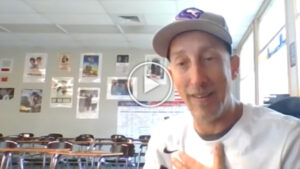Video transcript:
My name is Dave Dein. I’m the truck driving coordinator and instructor here at Patterson High School. We actually became one of the first high school truck driving programs in the nation, and the question I get asked most often is, “How in the world did you get started doing a high school trucking program?”
Graduating from high school, I definitely struggled academically. I was pretty much a D/F student and left high school without a plan. So I started looking at, “What do I love doing?”
And the thing that I found I love doing the most is driving. So I enrolled into a truck driving school. And that’s where something started to change in my life, because when I went to this truck driving school, I realized that I’m not stupid. I just didn’t care in high school.
So I decided to drive a truck to pay my way through college. I did graduate without any debt and graduated with honors with a business degree.
I went right back into trucking. It was a great company, great people, great money. And I was there about seven months. I ended up going to a friend’s barbecue one day. And in the backyard was a young boy, about nine years old, and he was there just hanging out by himself.
So I picked up a football, I started playing catch with him, and I asked him the one question that people always asked me when I was growing up, which was, “What do you wanna do when you get older? What do you wanna do as a career?”
And I remember he looked at me with these two cold, dark eyes, and he looked at me and he said:
“When I grow up, I want to go to prison.”
And that broke my heart.
I remember I just stared at him for a moment and he started weighing on my heart.
And about two weeks later, I was talking to a friend, and he said, “Dave,” he goes, “if you want to change the world, become a teacher.”
And I laughed at him. I said, “I don’t teach. I’m a truck driver with a business degree. That’s all I do.”
And he said, “Try subbing on your days off.”
I’m always up for a new adventure. So I’m thinking, you know what? It’d be fun to go into a classroom. So I started subbing on my days off from driving.
And it was about the third classroom I walked into that I saw a distinct pattern. It was in the written instructions that the teacher would leave for me. It’s called the sub plans. And at the bottom of all the sub plans was always a list of students’ names.
And above that list of names was a title.
And that title said, “Problem students… keep an eye out for these, these are the ones that are gonna cause you a hard time today.”
I took such great offense to that because I was probably on somebody’s list at that age.
So I took out their famous red pen and I scratched off the word “problem” and I wrote “possibility.” And I said, “These aren’t your problem kids. These are your possibility kids.” And that’s the day I decided to go into teaching.
Ended up taking a 50% pay cut. The first year was a struggle, financially.
I actually had to go back and drive a truck on Sundays — I’d go back and drive 15 hours on Sundays just to pay the bills. But I felt like I was doing something important. And it was a few years into my career when I had some of my students or their parents incarcerated.
I knew I could only do so much in the classroom. I read an article that said the number one thing that would keep people from re-offending is a job. And I knew that what these students needed more than anything else in the world was a positive role model in the family. I couldn’t do so much in the classroom, and I’m thinking, “I can get people jobs driving a truck.”
So in 2006, we started a nonprofit called Faith Logistics, and we would work [with] people coming out of the prison system. We would teach them how to drive trucks for free. It was more life skills. It was more about transitional skills. To see these lives being transformed was amazing.
And I had the blessing to do this for 10 summers.
In 2016, our nonprofit was dissolved. Because the trucks that were donated to us (and we had seven trucks at a time), they weren’t meeting the new California emission standards. So in 2016, we were forced to dissolve the nonprofit.
And it kind of broke my heart. It was something I loved doing. It was my passion.
It was about two months later, I saw the logistics program at Patterson High School and how they teach warehousing, supply chain, forklift certification. And I’m like, that’s great, but they’re missing the third component, which is truck driving. So I picked up the phone and I called the superintendent and shared with him very briefly my idea about it, starting a truck driving program — and they embraced that a hundred percent.
Six years ago, we started one of the nation’s first high school trucking programs. And it has developed over the years, it’s become more comprehensive. We were starting to get some schools that were calling us saying, “Hey, we heard about your program, how do we start a program?”
I was contacted by a lady out of Kentucky, her name’s Lindsey Trent, and she was working for Ryder at the time. We started doing some brainstorming as far as, “What’s the long-term solution?” And we decided to create a nonprofit. It’s a nonprofit business trade association called the Next Generation in Trucking Association, and our goal is very simple. Our goal is to educate more young people about the trucking industry.
Sadly, a lot of people that go through the educational system today are not exposed to any vocational trade or training. A lot of it is a singular path to college. And we need to start that conversation within the school districts.
We also want to provide support to high schools that are interested in replicating the Patterson program. And so we just received a grant through the Bendix Corporation that is enabling us to actually hire a professional curriculum writing company that is going to package the Patterson program into something tangible.
And that’s gonna be ready for the 2023 school year. We’re gonna be able to give that out to schools for free. Our nonprofit, we don’t sell anything. We don’t charge anything. We’re just here to provide free support. And so that’s something we got that’ll be launching next school year.
Truck driving is more than a job. Truck driving is a lifestyle. And growing up, I always felt I was maybe insignificant. I didn’t have a purpose. I remember the first time I climbed into a truck. Personally, myself, it just felt right. It just felt like it was, and it’s always been, my happy place.
I actually went back and I drove a truck last summer. Not because I had to, it was because I wanted to. I love trucking.
There’s something about it. There’s great freedom that comes with it. I love the sense of adventure. Every day is different.
One of the things we do in this classroom: it’s a very hands-on, interactive class. Yeah, it is considered theory, but we use a very engaging format to teach that theory. For example, we have two driving simulators, and these are very high-tech pieces of training equipment and we can create that muscle memory.
In fact, I just had a student that shared with me, just a few months ago, a picture — and it was a picture of his truck parked out on Interstate 5. The right front tire was completely gone, and he had a front tire blowout. He sent me this picture and he said, “Mr. Dein, this just happened.”
He says, “I’m texting you to thank you for the training that I received in your classroom because it just saved my life.” A front tire blowout is by far the worst thing can happen to you if you’re driving a truck. And he said, because of the simulator training that he had — he had no time to think, he just reacted — and we’re able to teach that muscle memory on the simulator. So when that front tire blew, he just instinctively went to the throttle and he applied the throttle really hard and that gave him forward momentum. The worst thing you can do, in fact, what a lot of drivers do, is they actually hit the brakes, and that’s where you lose control of the vehicle. And we have drivers that are dying, and they’re killing themselves and other people because they’re handling the situation incorrectly. And so I think we’re definitely training the right way.
Another thing that I love about this program is that we just don’t teach the basic skills of driving a truck.
We take more of a holistic view to trucking.
Every day we start off with what we call the daily updates. What are the top four or five headlines making the news? I want my students to keep a pulse on the industry. What’s going on with new technologies, legislation, business, mergers, whatever. Because I see our students as the future leaders in this industry, and you can’t lead anything unless you know what’s going on.
But we also look at the realities of this industry. This is a hard job if you’re not prepared for it.
And one of the things we incorporated the last couple years is not only ergonomics, as far as proper lifting techniques, through a company called Worklete — we just recently partnered with Dr. Mark Manera of the Supply Chain Fitness company, and he’s actually created a curriculum just for high school students that are pursuing this career. So we look at nutrition, physical fitness — we’re bringing in mental wellness, things that are just not talked about in any truck driving school.
Our ultimate goal is we want our students to have long, healthy careers, and that’s it. And so we wanna make sure they’re really prepared for the future.
Doing a hands-on class, it definitely eliminates so many of those other issues, as far as discipline issues. Because the students are always engaged in doing something.
The first year we taught this class, I let the counselors pick the students for me, and it was funny because they picked everyone who had a major discipline issue. I was scared. I looked at these rap sheets and I’m like, “This is gonna be horrible.” And that first year I taught this class, I had zero discipline issues that year.
Zero.
Everyone showed up on time. They weren’t absent. They were engaged.
They participated appropriately. And it’s really because we gave them an environment that wasn’t a traditional classroom. They weren’t forced to sit behind a desk for 60 minutes. They were engaged in the learning process, and I think that’s what makes this class so unique.
I feel I have a purpose now, and whatever happens — if they walked in today and said, “Hey we’re canceling your program” — I’m not leaving this. I’ll be out in the parking lot teaching this class.
I’m gonna keep doing what I’m doing, because this is what I was made to do. I guess this is where my heart’s at.
Share a link to this story
…or engage with Dave’s video on:
Wondering how you can support Dave and his students? You can visit the Next Generation in Trucking website, Facebook, or LinkedIn and the Patterson High School Trucking Facebook. You can also reach out to Dave on LinkedIn.
This video is one of 20 teacher interviews created to encourage the general public to #passthe🎤 to a teacher. You can view all video interviews here, on YouTube, on Facebook, or on Instagram Reels.


